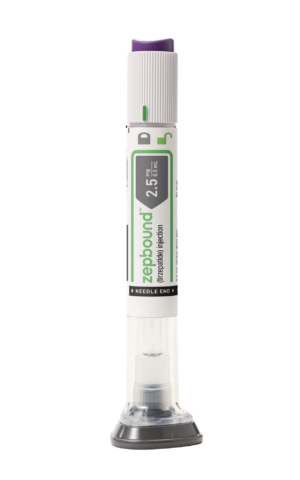New Meds Offer Hope for Weight Loss
Drugs like Ozempic, Wegovy, and Mounjare mimic the natural hormones that regulate hunger.
Atlantans are hungry for the new medications prescribed for diabetes and weight loss, including Ozempic, Wegovy, Mounjaro and now Zepbound, which was approved by the FDA just last month.
The challenge for many seeking the drugs, however, is a lack of availability at area pharmacies or an unwillingness by insurance companies to cover the cost, often upwards of $1,300. Ozempic and Mounjaro are intended for use by people with diabetes, while Wegovy and Zepbound are the higher dose versions intended for weight loss. Many physicians, however, are prescribing Ozempic and Mounjaro off-label for weight loss.
Most insurance companies deny coverage unless the patient has full-blown diabetes or a BMI of at least 27 and comorbidities like high blood pressure or a significantly elevated cholesterol level. Individuals with pre-diabetes are typically turned down by their insurance companies – even with a prescription from their physician — until their condition worsens and progresses to diabetes.
These medications work by mimicking the natural hormones that regulate hunger. They delay gastric emptying, which in turn reduces the appetite and, as a result, food intake. All four of the drugs contain an active ingredient that lowers blood sugar levels by helping the pancreas produce more insulin, which prevents the liver from releasing too much sugar. Mounjaro and Zepbound also decrease blood sugar by reducing glucagon, a hormone that increases blood sugar levels and keeps them from becoming too low.
Into the gap between demand and accessibility, a number of online pharmacies, medical spas and physician practices have entered, offering a less expensive, compounded version of the popular weight loss medications. The conundrum for many, however, is finding a provider who ensures that the compounded versions of the medicine they prescribe are both safe and effective.
According to Diane, despite her pre-diabetes and an excess 20 pounds that she has been unable to lose for nine years, Anthem Blue Cross and Blue Shield of Georgia refused to cover Ozempic and Wegovy. Because of another health condition, she was unable to take Metformin, an oral medication often prescribed for pre-diabetes. Her physician prescribed Ozempic, and when her insurance company denied coverage for the medication, the medical practice submitted another prescription for Wegovy, as well as the required documentation for coverage. After being turned down a second time by Anthem and exploring a few options, a friend recommended Medical Creations Integrative Medicine and Sheryl Westerman Nutrition Weight Loss and Consulting.
Dr. Dana Neacsu, the physician/owner of Medical Creations, is board-certified in internal medicine and on staff at Piedmont Hospital. She also completed a fellowship at the University of Arizona Integrative Medicine, one of the oldest and most respected programs of its kind, founded and taught by renowned physician Andrew Weil, MD.

Sheryl Westerman has been a nutritionist for 40 years, training in South Africa under a prominent clinician and practicing here in Atlanta since 1993. Together, the two professionals compose what one of their clients calls “the dream team” of weight loss.
“I trust this team immensely,” said Susan, a client who is currently on a generic form of Mounjaro (tirzepatide) and working with both Westerman and Dr. Neacsu. “I wanted to do the nutritional counseling in tandem with the injections so I could make smart food choices and maintain the weight loss long-term. Dr. Neacsu checks in with me about how I’m feeling every week at my appointments, and Sheryl has really gotten to know me in order to create a customized, extensive food plan tailored to my likes and eating style,” she said.
Susan has been on the program for seven weeks and has lost 12 pounds so far. She attributes her success to being held accountable by both professionals. According to Susan, “The key to success is having both a nutritional plan and the weekly injections. I also follow many of the recipes in ‘Slim Cooking,’ a book written by Sheryl that has delicious recipes that go way beyond the usual grilled chicken and steamed broccoli.”
For Rachel, who has diabetes and an Ozempic prescription covered by her health insurance, she attributes her successful weight loss to not feeling as hungry as she once did. “With Ozempic, my A1C has been lowered by at least a point, and I am eating half of what I used to. I just don’t feel as hungry, and I have been able to cut out any emotional eating, too. I feel full and eat three healthy, portion-controlled meals a day. To be honest, eating less has been effortless,” she said.
Rachel indicated she was morbidly obese until she started Ozempic two years ago. She has lost 30 pounds thus far. Her decision to turn around her health came after a consultation with a cardiologist who spoke with her in detail about making important lifestyle changes. Despite changing her eating habits, her A1C remained high. Since starting the weekly injections of Ozempic, she is not only much healthier, but her weight loss has also continued.
Dr. Neacsu understands the challenges facing many women as they try to lose weight and become healthier. Hormonal imbalances, menopause, hypothyroidism, and Polycystic Ovary Syndrome (PCOS) are just a few of the obstacles hindering weight loss. She has seen firsthand the impact of tirzepatide (generic Mounjaro and Zepbound) and semaglutide (generic Ozempic and Wegovy) not only on weight loss, but also in turning around diabetes, pre-diabetes, sleep apnea and high blood pressure, all illnesses impacted by excess weight.
During weekly appointments with each patient, Dr. Neacsu assesses their progress and discusses how to move forward in a safe and effective manner. She reviews water intake, weight loss, general health, and eating habits. Each person is weighed and then receives an injection based on their progress and health. Blood tests are taken every six months to a year.

Dr. Neacsu also believes that many of her patients will be able to go off the weight loss medications, although there is an ongoing debate in the medical community about whether or not a person can stop these medications and maintain the weight loss long-term.
“Once a patient has reached their health and weight loss goals, my approach is to gradually lower the dose in between visits or increase the time between visits,” she said. “Losing weight is a major life change, and I look at each person individually. Some patients are able to maintain the weight loss with good food choices and a solid plan. For others, I may recommend bioidentical hormones, natural supplements or even an elimination diet to see if certain foods need to be taken out of a person’s diet.”
The value of a solid nutritional plan, such as the individualized ones created by Westerman, cannot be minimized. Learning to make nutritious food choices is important in losing weight, and staying healthy and on track after weight loss, according to experts. “I recommend Dr. Neacsu for many of my clients so they can have a lift-off, so to speak, especially for those who have more weight to lose. Seeing the initial weight loss motivates many people to continue,” said Westerman. “Many patients hope to come off the weight loss medication at some point. It’s important they understand the essential food groups, portion control and how to eat for optimum health while they’re losing weight and for maintenance. Dr. Neacsu and I have found a seamless approach to helping people lose weight and stay healthy long-term,” she added.
To ensure safety and efficacy, Dr. Neacsu obtains all of her compounded weight-loss medications from an FDA-cleared, 503B pharmacy here in Georgia. The 503B designation was created by the FDA to establish an elevated level of patient care and safety. To obtain the status, an outsourcing facility must comply with strict cGMP (current good manufacturing practices) guidelines, which duplicate the same standards that pharmaceutical manufacturers must follow.

For help in weeding out unscrupulous pharmacies, The National Association of Boards of Pharmacy maintains a list of websites that sell fraudulent and unsafe medications. In addition, it is illegal for any online services to sell prescription medications without a physician consultation.
While these drugs have proven to be effective for weight loss, the medical community advises anyone considering use to consult with their primary care physician first to see if the medications are appropriate for them. People with a history of pancreatitis or other gastrointestinal issues, in fact, should discuss the safety of these medications with their physician. Likewise, those who have or have a family history of a rare thyroid cancer (medullary thyroid carcinoma) should not use these medications.
For more information or to reach the office, please contact Westerman at 404-257-9001 or email sherwesterman@aol.com.
Sheryl Westerman’s Tips for Weight Loss & Maintenance
• Every day is a new day to be motivated. Don’t let one bad day impact your commitment.
• Keep a food journal to monitor choices.
• Eat slowly and do not read, multi-task or watch television while eating.
• Be patient with weight loss and know the results will come if the plan is followed.
• Get active. Physical activity is important to overall health, well-being and long-term weight maintenance.
• For people on one of the weight loss medication, 60 to 90 grams of protein is needed each day. Protein shakes and bars can help with reaching that goal.
• Portion control and consistency are the keys to success.
• Drink at least half your body weight in ounces of water each day.
• Understand your trigger foods and stay away from them.
• The ultimate goal is not only reaching a goal weight but maintaining it throughout life.
- Health and Wellness
- Local
- Debbie Diamond
- Ozempic
- Wegovy
- Mounjaro
- Zepbound
- Weight Loss
- Diabetes
- glucagon
- Blue Cross and Blue Shield
- Dr. Dana Neacsu
- Medical Creations
- Piedmont Hospital
- University of Arizona Integrative Medicine
- Andrew Weil
- Sheryl Westerman
- Hormonal imbalances
- menopause
- hypothyroidism
- Polycystic Ovary Syndrome
- semaglutide




comments